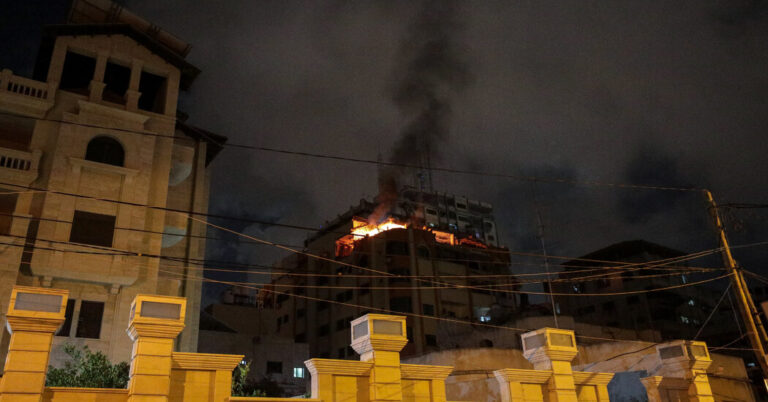
[ad_1]
The Israeli military said on Tuesday it had struck Islamic Jihad targets in Gaza, killing at least three leaders of the Palestinian militant group, as both sides braced for a possible sharp escalation in cross-border violence.
The airstrikes, which came a week after Islamic Jihad fired dozens of rockets at Israel, hit residential buildings across the Palestinian coastal territory. The Palestinian Ministry of Health in Gaza said at least 12 people were killed, including women and children, and at least 20 were injured.
The Israeli military said it had targeted and killed Khalil Bahitini, who it said had been responsible for launching rockets against Israel over the past month; Tareq Ezzedine, who had directed attacks against Israelis in the occupied West Bank; and Jihad Al-Ghanam, another high-ranking leader of the group.
The military wing of Islamic Jihad — which Israel, the United States and many other Western countries classify as a terrorist organization — confirmed the deaths of the three leaders, saying in a statement that they had been killed “as a result of a cowardly Zionist assassination at dawn today.”
The group said that some of the wives and children of the men had also been killed, adding that “the blood of the martyrs will increase our resolve, and we will not leave our positions and the resistance will go on, God willing.”
Gaza is dominated by Hamas, a larger Islamic militant group that sometimes acts in coordination with Islamic Jihad and, at other times, acts to restrain it.
Amid the strikes, the Israeli military instructed residents of Israel living within a radius of 25 miles of the border of the Palestinian coastal territory to stay close to bomb shelters for the next two days, in apparent expectation of retaliatory rocket fire.
Israel’s minister of defense, Yoav Gallant, declared an emergency situation along the border. The military issued a map of road closings in the area and shuttered border crossings for people and goods.
The deadly airstrikes started about 2 a.m. Tuesday and hit Gaza City and the southern city of Rafah, along the border with Egypt. Two hours later, the military said it was striking additional targets of Islamic Jihad.
The operation, which the military code-named “Shield and Arrow,” comes a week after a short burst of violence following the death of a prominent Palestinian prisoner, Khader Adnan, who had been on a hunger strike for 87 days to protest his detention. Islamic Jihad fired more than 100 rockets and mortar shells toward southern Israel in the 24 hours after his death, severely wounding a Chinese construction worker in the Israeli border town of Sderot.
Another brief flare-up a month ago came after an Israeli police raid in Jerusalem on the Aqsa mosque compound, a revered site known to Jews as Temple Mount, during the Muslim holy month of Ramadan. That prompted the Palestinian groups in Gaza as well as militias in Lebanon — led by Hamas, according to the Israeli military — to fire barrages of rockets at Israel.
Israel struck back at the militias in southern Lebanon, as well as at Hamas military sites in the Gaza Strip. It also hit militant sites in Gaza after last week’s rocket fire. But far-right members of the Israeli governing coalition complained that Israel’s response had been too weak, and the ultranationalist minister of national security, Itamar Ben-Gvir, demanded that Israel resume its policy of targeted assassinations of militant leaders.
Mr. Gallant, the Israeli minister of defense, said in a Twitter post before dawn on Tuesday that the military and the Shin Bet, the domestic security agency, had “precisely carried out their mission against the leadership of the Islamic Jihad in the Gaza Strip. Any terrorist who harms the citizens of Israel will regret it. We will pursue and catch up with our enemies,” he added.
Iyad Abuheweila contributed reporting from Gaza City and Gabby Sobelman from Rehovot, Israel.
[ad_2]